 Petzlover
Petzlover Komondor is originated from Hungary but Lithuanian Hound is originated from Lithuania. Komondor may grow 15 cm / 6 inches higher than Lithuanian Hound. Komondor may weigh 28 kg / 62 pounds more than Lithuanian Hound. Both Komondor and Lithuanian Hound has almost same life span. Both Komondor and Lithuanian Hound has almost same litter size. Komondor requires High Maintenance. But Lithuanian Hound requires Low Maintenance
Komondor is originated from Hungary but Lithuanian Hound is originated from Lithuania. Komondor may grow 15 cm / 6 inches higher than Lithuanian Hound. Komondor may weigh 28 kg / 62 pounds more than Lithuanian Hound. Both Komondor and Lithuanian Hound has almost same life span. Both Komondor and Lithuanian Hound has almost same litter size. Komondor requires High Maintenance. But Lithuanian Hound requires Low Maintenance
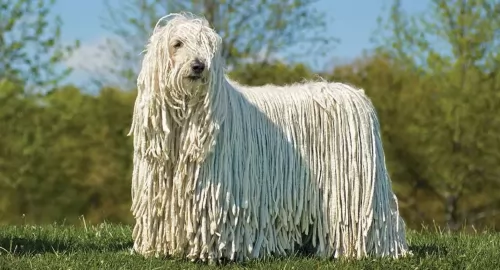 Looking like a giant mop, and sometimes being referred to as 'mop dogs' the Komondor, known also as the Hungarian sheepdog, hails from Hungary.
Looking like a giant mop, and sometimes being referred to as 'mop dogs' the Komondor, known also as the Hungarian sheepdog, hails from Hungary.
The dog was brought to Europe centuries ago so he is a well established breed. It has been declared as one of the country's national treasures.
He is a dog related to many other dogs such as the Pulim the Ovcharka, the Bearded Collie, Old English Sheepdog and others.
 This attractive dog hails from Lithuania.This is an old dog breed that has been used as a hunting dog.
This attractive dog hails from Lithuania.This is an old dog breed that has been used as a hunting dog.
It is believed that this dog dates way back to the 16th century and that it was developed from the mixing of hound breeds – Bloodhounds, Beagles, Polish Hounds and Russian Hounds.
The numbers of the dogs decreased and in the late 1970s, the Lithuanian Cytological Council developed a kennel facility for restoring Lithuanian Hound numbers, and a standard was also written. This breed is rare and is not usually found outside the Republic of Lithuania.
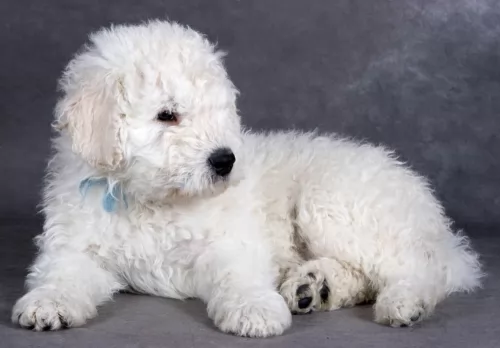 Known for his unique long corded, singular white coat, the Komondor, a molosser dog, is large. Females start at 64cm in height and both males and females can reach up to 76cm in height.
Known for his unique long corded, singular white coat, the Komondor, a molosser dog, is large. Females start at 64cm in height and both males and females can reach up to 76cm in height.
This unusual coat of theirs is wavy and actually forms cords or dreadlocks as the dog matures. You can't easily see the dog's face because of all the hair.You also can't see the tail easily, in fact you might think he hasn't got a tail as it is obscured by the hair. The tail is medium length and held low.
He has a large head, dark brown eyes, and floppy ears. The coat is certainly going to require grooming even though the dog doesn't shed much. His body is robust and well muscled with the body being slightly longer than the height of the dog.
The Komondor has been a dog used for guarding livestock, and while his character is calm and balanced, when the livestock is threatened, he can show another side – more aggressive – as he defends his flock. He makes an excellent watchdog.
He is an affectionate dog with his human family, being a gentle playmate of children. He is slightly reserved and wary of strangers, and is willing to guard and protect his human family from them.
He is also good with other family pets. When you look at him you might think of him as not being very energetic, but he is an athletic dog, fast and powerful. Because of his size and speed, it is best to have him trained and socialized as he can be obstinate. Training him makes him obedient.
 The Lithuanian Hound is a medium-sized dog which stands at between 53 - 61 cm in height and weighs between 27 to 32kg.
The Lithuanian Hound is a medium-sized dog which stands at between 53 - 61 cm in height and weighs between 27 to 32kg.
He is a well proportioned, sturdy dog, heavily boned and muscular with straight, strong legs. The coat of the dog is short, smooth and essentially black with some tan markings. He has a large head, bright brown eyes, black nose, deep, broad chest and long, floppy ears with rounded tips. The tail of the dog is long and held low.
The attractive Lithuanian Hound is a sighthound known for his hunting skills which he does with great determination and stamina.
He loves going on the hunt and forms a strong bond with his hunting handler, being reserved with people he doesn’t know. Lithuanian Hounds are generally easy to train and are eager to please. Training and socialization will be easy with a dog like this as he is intelligent and keen to please.They respond well to an owner who is confident, fair, patient and consistent.
His attachment to the family makes him a good watchdog too. After the hunt, he becomes an amicable, friendly, loving dog, loving to spend a quiet evening with his human family. He is energetic and doesn’t take too kindly to sitting around for long periods. He loves to be on the go and will require a good deal of vigorous exercise.
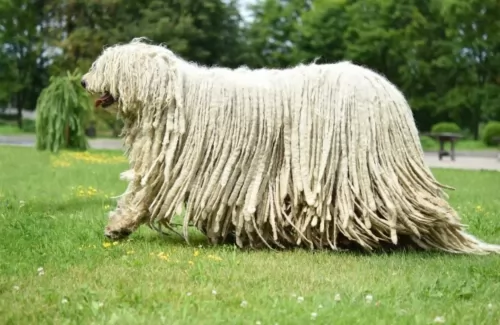 The Komondor is known for his strong guardian characteristics, especially with his human family. He is loving and loyal towards them while being wary of strangers.
The Komondor is known for his strong guardian characteristics, especially with his human family. He is loving and loyal towards them while being wary of strangers.
True, his coat can make people think twice before making this dog a pet, but if you're game and ready to attend to his coat, he can make an excellent family pet. They're fine with other pets too, and he is also an intelligent dog, capable of being easily trained.
He needs a good deal of exercise and can become noisy and destructive without the right amount of stimulation. If you do your part with the Komondor and provide him with a loving, caring home, he will be an awesome pet and guard you with his life.
 The Lithuanian Hound has always been a dog used for hunting, so he wants to belong to a family where hunting is still practiced or where there is a large garden.
The Lithuanian Hound has always been a dog used for hunting, so he wants to belong to a family where hunting is still practiced or where there is a large garden.
He is smart and easy to train, and what’s more he’s a healthy, robust, low maintenance dog. He’s an amicable dog too, calm, independent and confident, and will make a splendid companion to his human family. He gets on well with children and is willing to share his space with other dogs too.
By choosing the Lithuanian Hound, you’re allowing a wonderful canine friend into your home and heart.
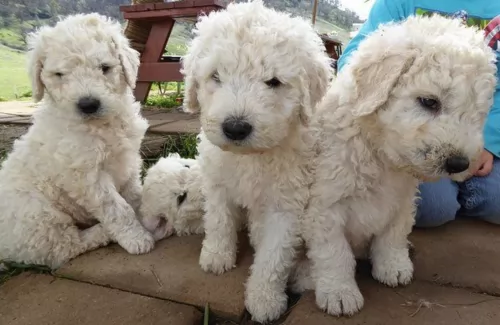 The Komondor is a healthy dog breed who can live to be 10, 11 or 12 years if you look after him well. There aren't any known genetic disorders prominent with the dog, but it pays to know about some of those that could strike -
The Komondor is a healthy dog breed who can live to be 10, 11 or 12 years if you look after him well. There aren't any known genetic disorders prominent with the dog, but it pays to know about some of those that could strike -
This is an irritating eye problem where the eyelash rubs up against the eyes.The result can be scratching of the cornea and eye infections. It is an eye problem which can be corrected with surgery.
Hip dysplasia is a serious genetically inherited disorder and common in large dog breeds. It is caused by a malformation of the hip joint. It can cause problems for the dog, weakening the hip and making it incapable of supporting the weight of the dog.
It also leads to pain for the dog, difficulty with moving and even total lameness. Weight, size of dog, age and genetics are all factors which can increase the dog's likelihood of developing hip dysplasia.
Whimpering, lethargy and refusing to put weight on the leg are common signs of hip dysplasia and your vet will go ahead with ways to relieve the pain and symptoms of your Komondor.
 Lithuanian Hounds can reach 12 – 14 years of age when they’re loved and well cared for. You won’t find many medical problems with this robust dog breed, but it pays to know some of the more common dog illnesses.
Lithuanian Hounds can reach 12 – 14 years of age when they’re loved and well cared for. You won’t find many medical problems with this robust dog breed, but it pays to know some of the more common dog illnesses.
This is a genetic condition that affects the hips and which can lead to painful arthritis. Dogs prone to hip and elbow dysplasia always benefit by avoiding obesity.
Deep chested dogs are more prone to Bloat, occurring when gas builds up in the stomach and can’t escape. This is a life threatening illness and immediate medical attention will be required.
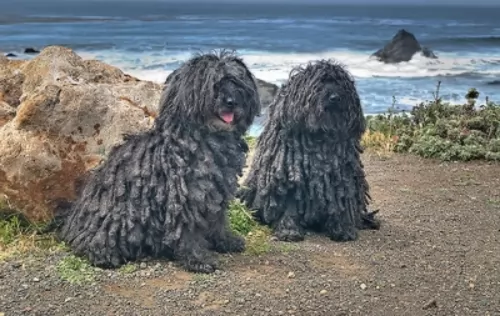 The Komondor is most certainly not a low maintenance dog with that extraordinary coat.Before the dog turns 1, the coat begins to form its cords. These cords can become discolored and matted, In fact the cords will need to be separated to keep the dog clean and free of matted hair.
The Komondor is most certainly not a low maintenance dog with that extraordinary coat.Before the dog turns 1, the coat begins to form its cords. These cords can become discolored and matted, In fact the cords will need to be separated to keep the dog clean and free of matted hair.
For those who keep the dog as a pet and who don't want him to be a show dog, he can be trimmed, otherwise the coat and its maintenance could turn out to be a real issue.
Of course once the distinctive coat has been sheared, he loses that typical and recognizable Komondor look.
Check his ears on a regular basis for wax- and dirt buildup so as to prevent ear infection.
Teeth need to be checked regularly to prevent tartar buildup and if you don't have the time or the knowledge to keep his teeth clean and maintained, take him to the vet as the teeth-treatments they do there will promote healthy teeth and gums.
 This energetic dog is going to want a lot of exercise as he has always been a hunting dog. While a long, brisk walk will be excellent for him, he will want more activity than that. He’ll want to be included in all your activities – walks, hikes, camping trips and swimming.
This energetic dog is going to want a lot of exercise as he has always been a hunting dog. While a long, brisk walk will be excellent for him, he will want more activity than that. He’ll want to be included in all your activities – walks, hikes, camping trips and swimming.
A big positive with the beautiful, sleek Lithuanian Hound is that he is looked upon as a low maintenance dog. The short coat will require a good brush down twice a week.
He sheds a couple of times during the year. He’s the kind of dog who thrives on these grooming sessions and it’s a time to check him over for ticks and fleas as well as for odd lumps.
Look inside his ears too, particularly since he is a floppy eared dog. Open his mouth too and keep his teeth brushed and clean. There is special canine toothpaste and toothbrush for this purpose. Never try to use human toothpaste as it can be toxic for your dog.
There are a number of things to consider when it comes to feeding your dog, but it goes without saying that the best, most nutritious food will ensure health and longevity.
If you feed your pet commercially manufactured pet food, use the feeding guidelines found on the packaging labelling. With any new food types you give your dog, keep an eye on him for reactions.
Your dog’s metabolism and energy levels as well as his age will determine how much to feed him.
There are many excellent dog foods available – choose an excellent one and make sure to feed your dog some tasty, nutritious home-made food too.
You can’t go wrong with some cooked chicken, brown rice or pasta and some raw and cooked vegetables. Chop up and add to his dry kibble from time to time and he’ll be happy and healthy. Raw meat is expensive but try and include some every now and then as it contributes to allergy-free skins, bright eyes, shiny coats, wet noses and wagging tails.